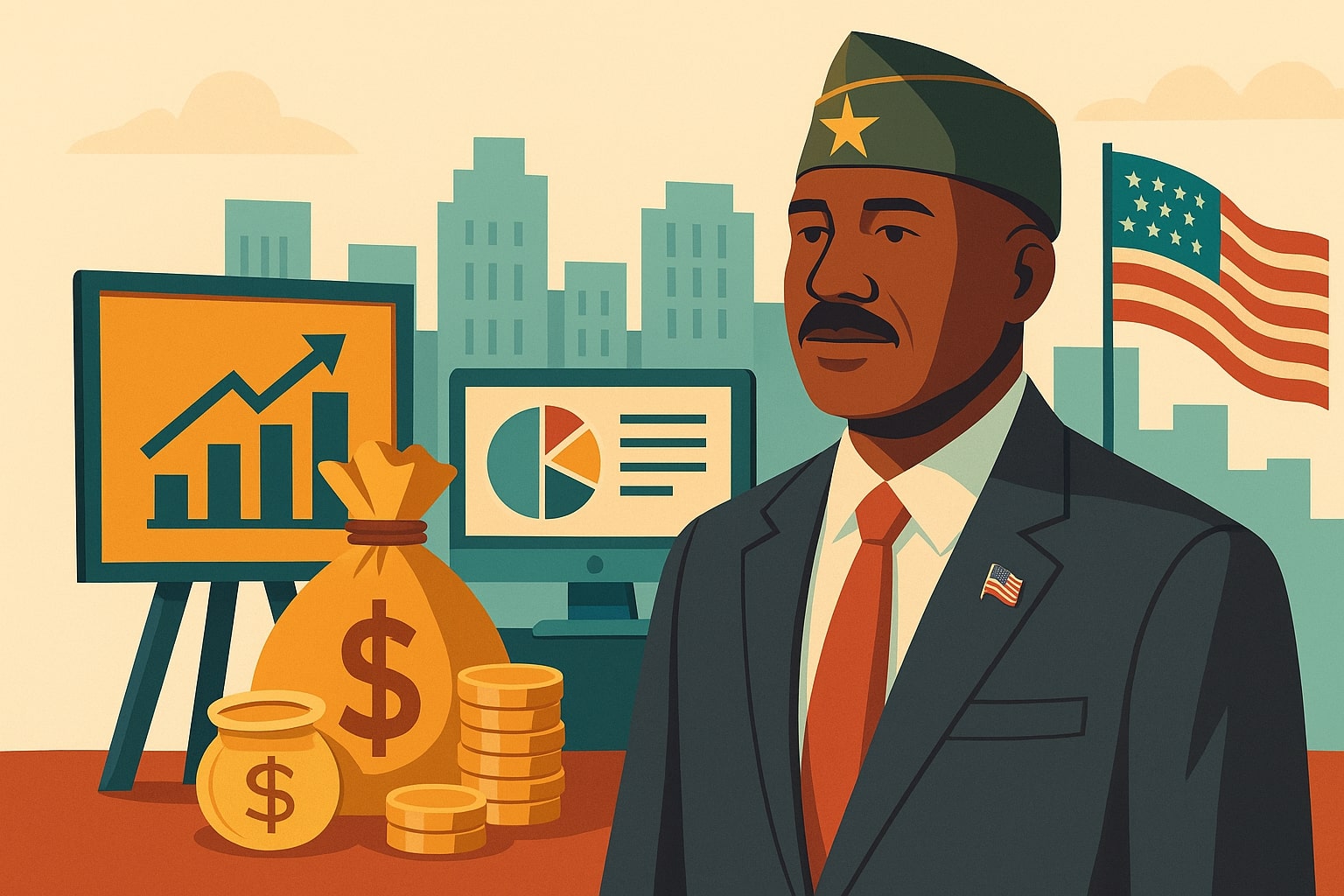
Veteran Small Business Grants: Funding Opportunities for Veterans in 2025
Veterans are a dynamic segment of American entrepreneurship. Nearly two million veteran-owned businesses operate in the U.S., employing over five million people.
When launching or expanding a small business, veteran entrepreneurs can tap into a variety of small business grants for veterans at the federal, state, and local levels. Unlike loans, grants do not require repayment, allowing veterans to invest every dollar back into their venture.
This article provides a deep dive into veteran small business grant programs – including federal and state offerings – tailored for all veterans, whether you’re a new veteran entrepreneur, a disabled veteran, or running a minority-owned enterprise.
We also outline eligibility checklists and application tips to help you compete successfully for these grants.
Key takeaways: Grants are “free money” for veterans’ businesses. Programs range from government SBIR/STTR research grants to local contests by corporations like FedEx.
Many grants target specific groups (women veterans, disabled veterans, minority veterans) and have criteria such as majority veteran ownership, business size limits, or location requirements. To win grants, review eligibility carefully, prepare a strong business plan, and follow each program’s application guidelines.
Federal Grant Programs for Veteran-Owned Businesses
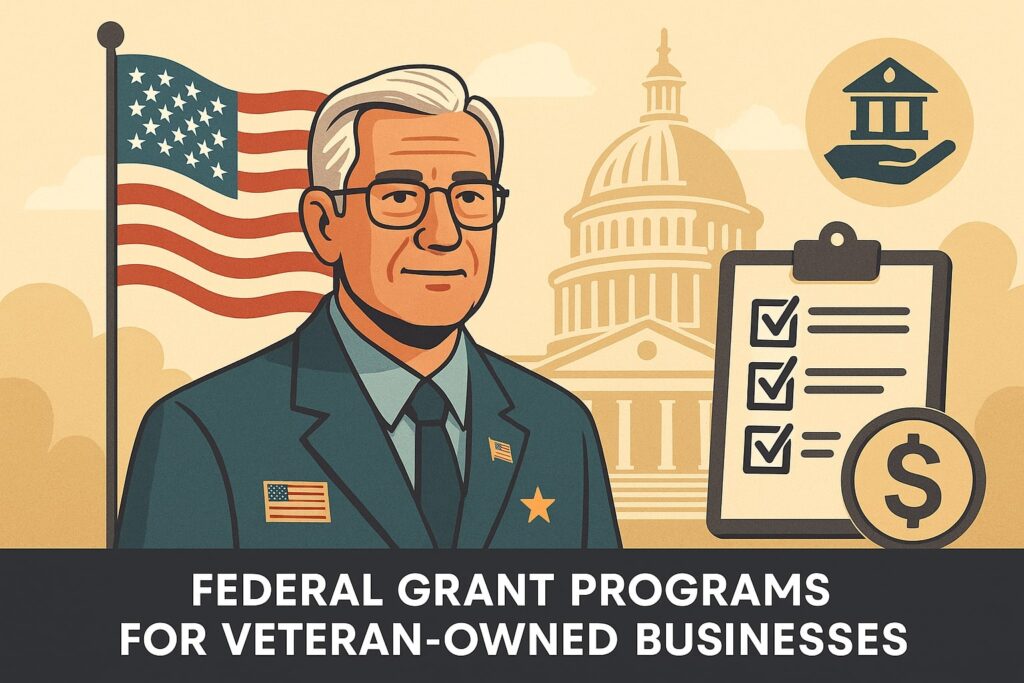
While federal grant opportunities specifically for veteran entrepreneurs are limited, several nationwide programs can benefit veteran-owned small businesses.
Some federal initiatives explicitly welcome veterans, and others are open to all small businesses (veteran-owned or not). Key federal grant sources include:
- SBIR/STTR (Small Business Innovation Research and Technology Transfer): The SBIR and STTR programs provide non-dilutive R&D grants to small U.S. businesses, including those owned by veterans, who are developing innovative technology.
Coordinated by the SBA and 11 federal agencies, SBIR/STTR awards can range from roughly $314,000 in Phase I to over $2 million in Phase II.
To qualify, your business must be U.S.-based, for-profit, primarily owned by U.S. citizens or permanent residents, and have fewer than 500 employees. These programs are highly competitive but offer substantial funding for tech-oriented ventures. - Grants.gov: This federal portal lists more than 1,000 grant programs from agencies like the Departments of Veterans Affairs, Commerce, Labor, and more. Veterans can search this database for small-business grants that match their industry or demographics.
While most grants on Grants.gov aren’t exclusive to veterans, using it to identify relevant federal opportunities is a good first step. For each grant on Grants.gov, be sure your business meets all eligibility criteria before applying. - Small Business Administration (SBA) Programs: The SBA primarily provides loans, but it also funds programs that benefit veteran entrepreneurs.
For example, the Veterans Business Outreach Center (VBOC) Program offers free counseling and training, and the Boots to Business entrepreneurship course introduces transitioning service members to small business.
(These are not grants, but valuable no-cost resources.) The SBA also periodically funds training grants to organizations that serve veteran entrepreneurs.
Notably, SBA’s Service-Disabled Veteran Entrepreneurship Training Program (SDVETP) provides training to disabled veterans starting businesses.
While these SBA programs are not direct grants to business owners, they can help veterans prepare to apply for grants or compete for other funding. - VA Self-Employment (VR&E) Track: The Department of Veterans Affairs offers the Vocational Rehabilitation & Employment (VR&E) Self-Employment track for veterans with service-connected disabilities.
Eligible veterans can receive guidance, planning assistance, training, and coordination services to start a business. (Note: VR&E benefits do not typically include direct startup capital, but they can provide technical assistance and may help veterans develop solid business plans and access resources.)
If you qualify for VR&E and have a disability, this program can complement grant-seeking by strengthening your business foundation. - Minority Business Development Agency (MBDA): If you are a veteran and also belong to a racial/ethnic minority group, the U.S. Commerce Department’s MBDA offers grants and contracts for minority-owned businesses.
MBDA business centers around the country often hold grant competitions or make awards to help minority entrepreneurs grow. Though not veteran-specific, a minority veteran could qualify under MBDA programs.
(For example, MBDA has funded grant competitions through local MBDA centers and for initiatives like business expansion or exporting.) - Other Federal Initiatives: Several federal agencies offer competitive grants (e.g. USDA, NIH, Dept. of Energy, Dept. of Transportation) that veteran-owned businesses could apply for if eligible.
For instance, Agriculture vets can explore USDA Rural Development grants, and tech vet-entrepreneurs can look to NIST or NIH SBIR solicitations.
Also, programs like the U.S. Chamber’s America’s Top Small Business Award ($25,000) is open to any qualifying small business, including those owned by veterans.
While not government-run, these high-profile awards often have application periods each year and veterans are encouraged to apply.
State and Local Veteran Small Business Grants
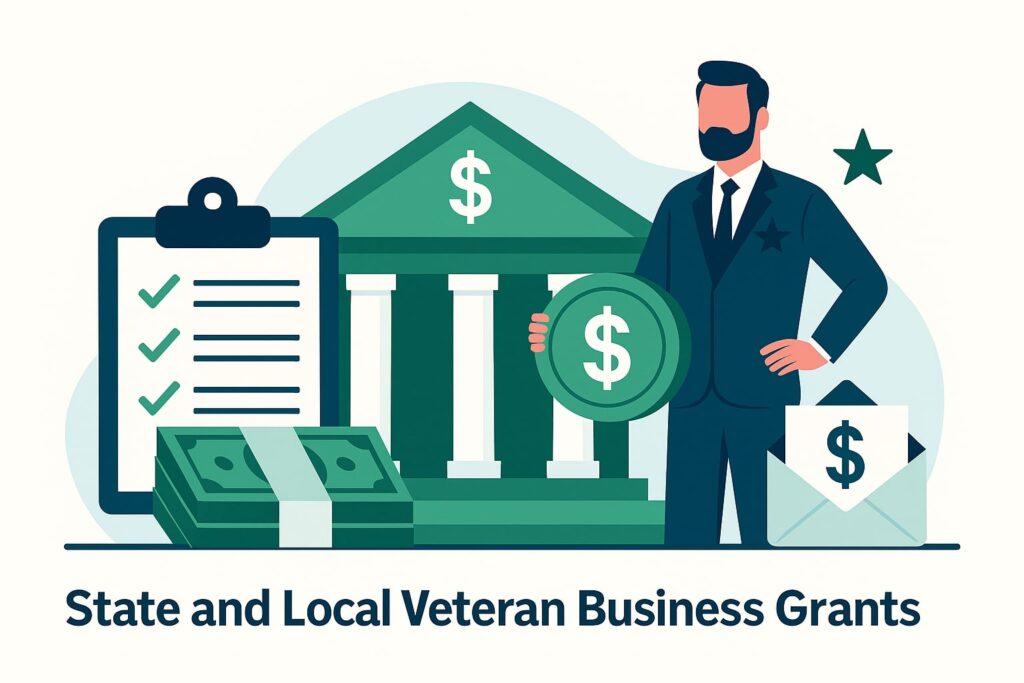
Many U.S. states, counties, and cities have programs to boost small businesses and may include veteran-specific funds or priority. Unlike federal grants, these local programs vary widely. Below are examples of notable state or community grants targeting veteran entrepreneurs:
- Illinois (Chicagoland) – Job Creators Quest Grant: Managed by FoundersFirst CDC, this program awards a total of $100,000 (in prizes) each cycle to Illinois-based, for-profit businesses.
To qualify, the business must operate in Illinois and the founder should identify as a military veteran (or as Black, Asian, female, LGBTQ+, or serve a low-income area).
Businesses need 2–20 employees and $100K–$3M in revenue, and must plan to create one or two new jobs. (This grant is competitive and includes a pitch event.). - Southern California – Job Creators Grant: This California program, similar to Illinois’s, awards $100,000 in total funding (split among 25 winners) to for-profit businesses in Southern California.
Eligibility criteria include having a veteran founder (or other priority founder groups) and meeting size and revenue thresholds (2–20 employees, $100K–$5M revenue).
Applicants also must demonstrate plans to add one or two minimum-wage jobs in the coming year. - Michigan – Michigan Veteran Entrepreneur-Lab (MVE-Lab): Run by Grand Valley State University, MVE-Lab is an intensive accelerator program (cohort-based) specifically for veterans and military spouses.
Participants receive startup training, mentoring, and the chance to pitch their business. The program culminates in a “Pitch Showcase,” where veterans compete for cash prizes up to $20,000.
The MVE-Lab is open to Michigan residents; even if you win no cash prize, you gain valuable education and networking. - Texas – TWU Veteran Woman Entrepreneur Grant: Texas Woman’s University offers five $5,000 grants each year to businesses 51% owned and controlled by women veterans.
The business must operate in Texas as a for-profit (corporation, partnership, LLC, etc.) and the veteran-woman owner must be a U.S. citizen or permanent resident.
These grants can fund equipment, marketing, or other business expenses to help launch or grow the enterprise. - North Carolina (Charlotte) – Beyond Open Small Business Grants: Charlotte’s Beyond Open program is focused on historically excluded entrepreneurs, including veterans. It awards dozens of grants starting at $10,000 (and up to $150,000) annually.
Applicants must have a Charlotte-area business and belong to a qualifying category (veteran-owned is explicitly included, along with minority, women, LGBTQ+, or disabled entrepreneurs). - Local & Regional Programs: Many other states and municipalities run small-business grant contests or loan/grant hybrid programs.
For example, the Illinois Department of Commerce often has innovation grants (though veteran-specific is rare), and some cities have Minority or Women Business grants (where minority veterans can apply).
Also look into your state’s veterans affairs office or economic development agency websites: some states have veteran business scholarships or entrepreneurial competitions. (Consult resources like the SBA state contacts for leads.)
Below is a summary table of prominent veteran/business grants (both national and local) with their key awards and eligibility:
| Grant Program | Award | Key Eligibility (Veteran-focused) |
|---|---|---|
| Hiring Our Heroes Small Business Grant | Five $10,000 grants (2025) | U.S. veteran or military-spouse-owned (≥51% owner), 3–20 employees, ≤$5M revenue, in an economically vulnerable area. |
| Warrior Rising Startup Grant | Varies (prize from pitch competitions) | Veteran (or immediate family) entrepreneurship program. Applicants complete a 6-step training; eligible if veteran/mil-spouse. |
| America’s Top Small Business Awards | $25,000 grand prize (plus other awards) | Open to any for-profit small business (≥1 year, <250 employees, <$20M revenue); veterans welcome. |
| SBIR/STTR (Federal R&D grants) | Phase I ~$314K; Phase II ~$2M | U.S. small technology/innovation business; <500 employees; focused on research & commercialization. (Veteran-owned firms can apply like any other small biz.) |
| Farmer Veteran Fellowship Fund | $1,000–$5,000 (to support farm startup) | U.S. veteran in early-stage farming or ranching; must join the Farmer Veteran Coalition to apply. |
| NASE Growth Grants | Up to $4,000 (quarterly) | Member of the National Assoc. of the Self-Employed (veterans get 15% off dues). Grants can fund marketing, hiring, equipment, etc.. |
| FedEx Small Business Grant Contest | Ten grants: $50K (1st) + $20K each (9) | Any U.S. for-profit small biz (6+ months operating) with a FedEx shipping account. (Not veteran-specific, but open to veterans.) |
| Venmo Small Business Grant | $10,000 (to 20 winners) | U.S. small business using Venmo; ≤10 employees and <$50K annual revenue. (Open to all small biz owners.) |
| Texas Woman’s Univ. Vet Woman Grant | Five grants of $5,000 | Texas-based, for-profit business that is ≥51% owned and controlled by a woman veteran. |
| Southern California Job Creators | $100,000 total ($4,000 per winner) | SoCal business; founder identifies as veteran (or other priority groups), 2–20 employees, $100K–$5M revenue. Must create 1–2 new jobs. |
| Chicagoland Job Creators Grant | $100,000 total (25 businesses) | Illinois business; founder identifies as veteran (or BIPOC, female, LGBTQ+), 2–20 employees, $100K–$5M revenue. |
| Beyond Open (Charlotte, NC) | Multiple grants ($10K+) | Charlotte-area business owned by veteran (or minority, woman, LGBTQ+, disabled). Grants used for assets like equipment or property. |
(Table: Selected veteran and small-business grant programs, award amounts, and eligibility. Sources: program websites and guides.)
In addition to the above, many states offer general small business grants that veteran entrepreneurs can compete for. Check your state’s economic development or small business agency.
For example, New York’s veterans can get certified under the state’s Vet-Owned Business program and may be eligible for certain incentives.
Grants for Specific Veteran Groups
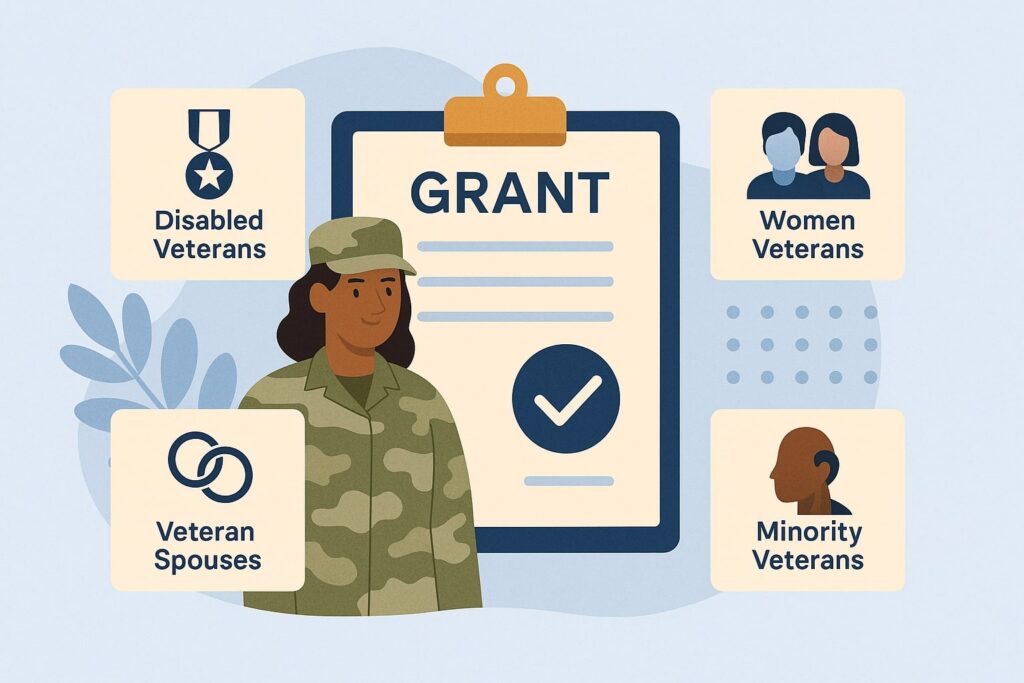
Veteran grant programs often target particular demographics. Here are some tailored categories:
- Disabled Veterans: Some grants specifically help service-disabled veterans. The Stephen L. Tadlock Veteran Grant (offered by FoundersFirst CDC) is a good example: it awards 25 microgrants of $1,000 each to U.S. veterans owning small businesses (2–100 employees, ≤$5M revenue).
Importantly, this grant is open to disabled veterans as well as any veteran-owned small business, so disabled veterans count. Additionally, disabled veteran entrepreneurs can leverage SBA resources like the SDVETP training and consider contracting set-asides (though those are contracts, not grants). - Minority Veteran-Owned Businesses: If you are a veteran who is also a member of a minority group, you can access programs for minority businesses in addition to those for veterans.
For example, the MBDA provides targeted grants to minority-owned businesses, and local minority business centers or foundations often hold contests.
Programs like Feed the Soul Foundation’s Restaurant Development Grant prioritize veteran restaurateurs who are also Black, Latinx, or otherwise from underrepresented backgrounds.
(The Feed the Soul program gives training plus a $10,000 stipend to food businesses meeting those criteria.)
Also, many “inclusive” grants (like Chicagoland, Charlotte’s Beyond Open, etc.) include veterans as a priority group alongside minority or women entrepreneurs. - Women Veterans: Female veterans have access to specialized grants. Besides the Texas Woman’s University grant, another example is the Melissa Washington Small Business Award, a $5,000 grant for women veteran entrepreneurs (Application was open May-June 2025).
Also, women veterans can apply to general women-owned business grants (e.g. H&R Block’s “Fund Her Future” program, though it’s broad women-owned) or competitions like FedEx, where women-owned companies often compete. - New (Early-Stage) Veteran Entrepreneurs: Some programs welcome startups and even pre-revenue businesses.
For instance, Warrior Rising provides startup training and includes pitch opportunities, and its grants competition is open to veterans at any stage, including startups.
Similarly, Second Service Foundation’s Military Entrepreneur Challenge accepts very early-stage ventures, requiring only a one-page plan and a two-minute pitch.
Membership-based grants like NASE are also accessible to new sole-proprietors if they join. In general, new veteran entrepreneurs should focus on competitions (like pitch contests) and training programs with grant components, since many standard grants expect an operating history.
Tips for Applying and Eligibility Checklist
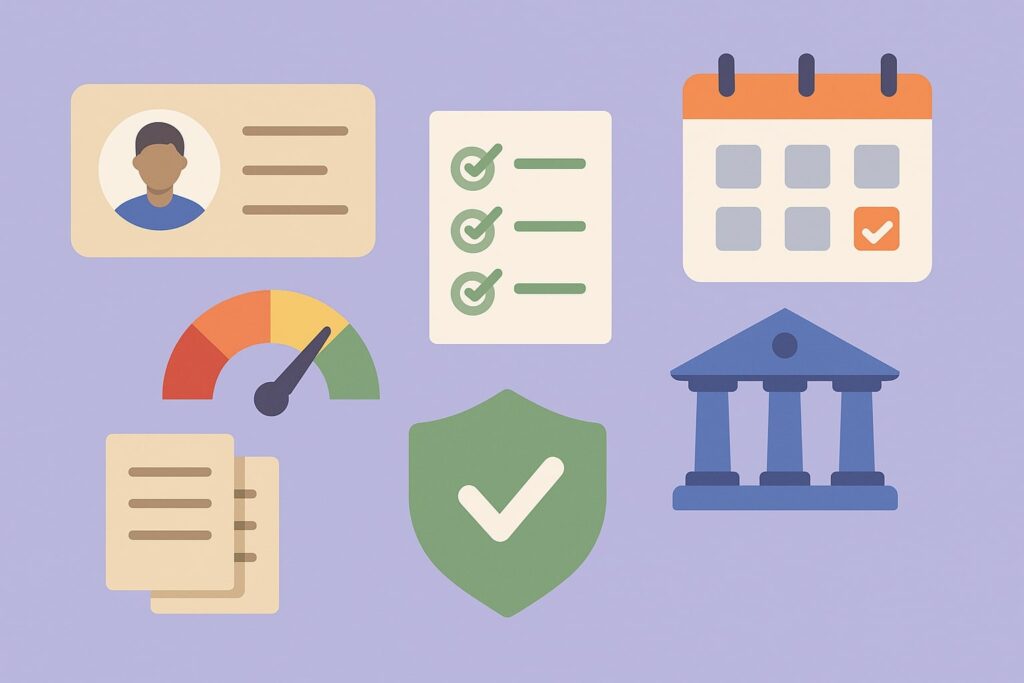
Applying for grants can be competitive and time-consuming. Here are some best practices and a rough eligibility checklist to keep in mind:
- Check Eligibility First – Before investing time, ensure your business meets all requirements. Many veteran business grants require at least 51% ownership by a U.S. veteran (or military spouse), and often by a veteran with documentation (DD214, VA ID, etc.).
For example, the Hiring Our Heroes grant requires 51% veteran/spouse ownership, and the Texas Woman’s University grant requires 51% veteran women ownership.
Note any revenue or employee caps (HOH caps at $5M revenue, many grants cap at 20 or 100 employees), location or industry restrictions, and other criteria like disadvantaged status. Create a checklist of requirements for each grant you pursue. - Prepare a Strong Business Plan & Budget – Many grant applications ask for a business plan or project proposal. A well-crafted plan (including clear use of funds) can set you apart.
If you’re not confident in writing one, use free help: SBA’s Veterans Business Outreach Centers and SCORE mentors can assist in writing plans or financial forecasts. (Swoop’s guide notes you may consider hiring help if needed.) - Gather Required Documentation – Applications typically request proof of veteran status (DD214, VA service document, or veteran certification), business formation papers, EIN and tax returns (if existing business), financial statements, and sometimes personal financial info.
The Hiring Our Heroes grant notes owners and contractors count in employee totals, so be ready to submit payroll or contractor details. If multiple owners exist, document percentages of ownership. - Follow Instructions Carefully – Each grant has its own application process and deadlines. Submit all requested information exactly as asked, in the required format. Late or incomplete applications are usually disqualified.
For multi-stage grants (like some pitch competitions), be mindful of each deadline. As Swoop advises, pay attention to stage dates and don’t miss any steps. - Tailor Your Narrative – Grants are often adjudicated by reviewers unfamiliar with your business. Write clearly about how your business works, why you need funding, and how it will benefit your veteran community or economy.
Highlight your veteran status as a strength (leadership skills, military training, etc.), and align your goals with the grant’s intent.
For example, if a grant aims to create jobs in a low-income area or empower minorities, emphasize those aspects of your business if applicable. - Proofread and Get Feedback – Grammatical errors or unclear writing can hurt your application. Review all answers and financial figures carefully.
If possible, have someone else (an advisor or peer) read your application before submission. Clarity and professionalism make a strong impression. - Plan for Non-Repayment (and Reporting) – Remember that winning a grant often comes with obligations. Unlike loans, you don’t repay the money, but you may need to report on how you spent it and what outcomes you achieved.
Keep good records. Also, think of grants as supplemental: many grant programs expect you to continue self-funding or to seek additional financing if needed, since grant awards may be modest relative to business needs.
By understanding each grant’s rules and thoroughly preparing your application, you boost your chances of receiving funding. Before applying, ask: “Why am I a strong fit for this grant?” and be ready to show it.
How to Find Veteran Business Grants
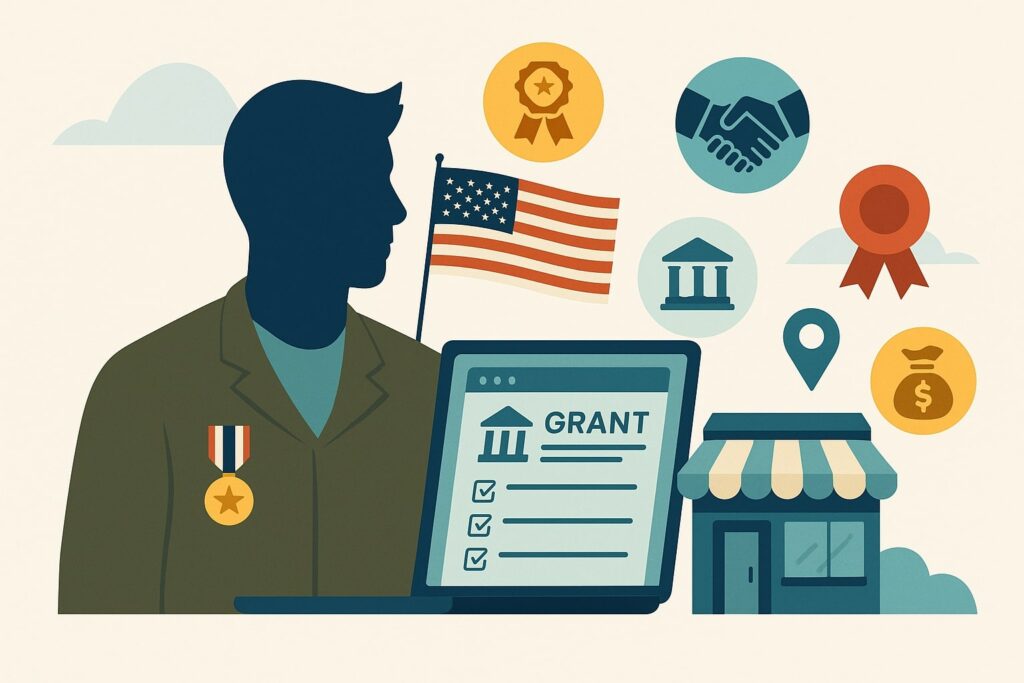
Beyond the specific programs listed above, use these resources to discover more opportunities:
- Grants.gov – The federal grants database lets you filter for small business programs. Search keywords like “veteran,” “entrepreneur,” or your industry. Remember, even if a grant isn’t labeled “for veterans,” it may allow veteran owners to apply.
- GrantWatch – An online directory of public and private grants. You can filter by “veteran” or “military spouse” to find relevant competitions and grants nationwide. Basic searching is free, but full details require a low-cost subscription.
- Veteran Support Organizations – Groups like StreetShares Foundation (Second Service Foundation), Warrior Rising, and Veterans United regularly announce grant contests. Follow their websites or newsletters. (For example, the StreetShares MEC had specific regional events.)
- Local VBOCs and SBDCs – SBA’s Veterans Business Outreach Centers (VBOCs) and Small Business Development Centers (SBDCs) often maintain lists of local grants and workshops. They can guide you to state/local programs.
- State Veterans Affairs Offices – Many states have Veterans Business Outreach or Veteran Entrepreneurship portals.
These sites sometimes list state grants or competitions (for example, Veterans Florida Entrepreneurship Program provides training and a pitch competition). - Chamber of Commerce / Industry Groups – Some chambers run awards like the Top Small Business Awards. Industry associations or franchises (e.g. VetFran) may have funding initiatives for vet-owned businesses.
Frequently Asked Questions
Q: What can I use a veteran business grant for?
Answer: A grant can be used for business expenses specified by the program – typically equipment, inventory, marketing, hiring, training, or expansion costs. Each grant outlines allowable uses.
For example, the NASE Growth Grant explicitly funds marketing, hiring, or capital purchases. Be sure to propose a budget that aligns with the grant’s purpose.
Q: Do I need a business to apply?
Answer: Most grants require an established business entity, but some competitions allow startups. For example, the Second Service Foundation’s pitch competition accepted entrepreneurs with a one-page plan.
Warrior Rising accepts both startups and existing businesses. Check each program’s rules; you often at least need a formed business or a solid idea and plan.
Q: Are disabled veterans eligible for more grants?
Answer: Disabled veterans can generally apply to any veteran-centric grant. Some programs specifically mention disabled veterans (e.g. Stephen L. Tadlock Grant is open to disabled vets).
Additionally, disabled vets may qualify for certain state or nonprofit grants aimed at disability entrepreneurs. However, a single “disabled veteran grant” does not exist – instead, disabled status is often an eligibility advantage or separate category in broader programs.
Q: How do minority veteran-owned businesses find grants?
Answer: If you are a veteran who is also a minority (Black, Hispanic, Asian, Native American, etc.), look for minority business grants. The U.S. Commerce Department’s Minority Business Development Agency offers grant programs and free consulting via MBDA Business Centers.
Many local minority chambers and foundations (e.g. Hispanic or Black Chambers of Commerce) run grants or pitch contests. Also, grants for underserved entrepreneurs often list “veterans” as a priority – for instance, the Chicago and Charlotte programs we described include veterans among the target groups.
Q: Where can veterans find application assistance?
Answer: The SBA’s Veterans Business Outreach Centers (VBOCs) provide free counseling to veteran entrepreneurs. VBOC advisors can help you refine a business plan or review a grant application. Similarly, SBDCs and SCORE chapters have volunteer mentors.
VA’s Veteran Entrepreneur Portal (VEP) is also a one-stop online portal linking to resources (though it focuses on tools and information rather than direct grants).
Q: What should I do if my business doesn’t qualify for any veterans-only grants?
Answer: Even if a grant isn’t specifically for veterans, you can still compete for many small-business grants. Programs like FedEx Small Business Grant and eBay Grants are open to all U.S. small businesses.
You can also seek traditional financing (e.g. SBA loans with veteran incentives) if grants fall short. But first thoroughly explore all federal, state, and private grant options, as veteran status can be a strong advantage in many competitions.
Conclusion
Veteran small business grants offer an excellent opportunity to gain capital without taking on debt. In 2025, numerous programs – from federal R&D grants (SBIR/STTR) to local pitch competitions – are available to help veteran entrepreneurs start and scale their businesses.
Key grants like the Hiring Our Heroes $10K awards, Warrior Rising funding, NASE Growth Grants, FedEx and Venmo contests, and many state-specific programs can infuse critical funds. Remember to carefully match your business to each program’s criteria and to prepare a compelling application.
Use resources like Grants.gov, GrantWatch, and veteran support organizations to discover opportunities. With thorough preparation and persistence, veteran entrepreneurs of all backgrounds – including disabled and minority veterans – can secure grants to help realize their business goals.